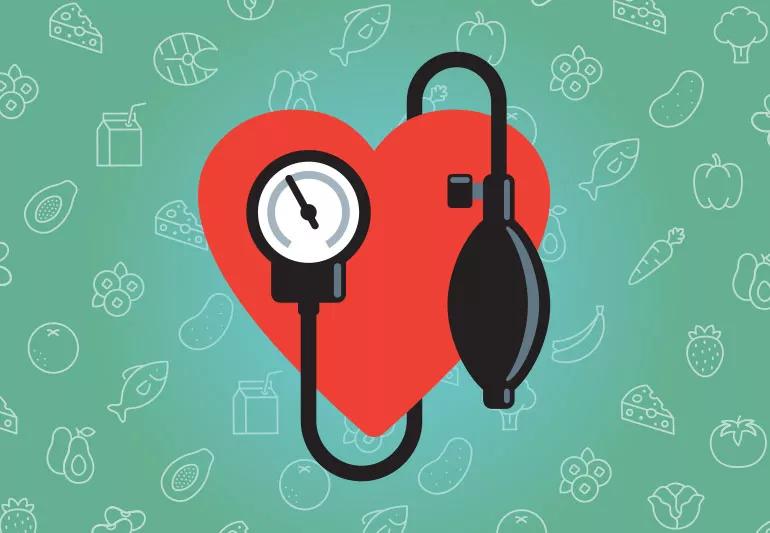Foods high in vitamins C and E can help lower your blood pressure

Image content: This image is available to view online.
View image online (https://assets.clevelandclinic.org/transform/adbd9dc2-591c-4769-a318-49aa2a8b08cb/foodLowerBP-1250234327-770x533-1_jpg)
food to lower your blood pressure
Keeping your blood pressure in check is important for your health.
Advertisement
Cleveland Clinic is a non-profit academic medical center. Advertising on our site helps support our mission. We do not endorse non-Cleveland Clinic products or services. Policy
If it’s too high, your blood pressure can lead to serious conditions like stroke or heart disease.
While medications like beta-blockers can help lower your blood pressure, did you know that certain foods and nutrients can help as well?
Registered dietitian Julia Zumpano, RD, LD, shares how certain foods can help lower your blood pressure.
Antioxidant-rich foods may have a small impact on blood pressure levels. Foods high in vitamin C, vitamin E, potassium, selenium or L-arginine are good options if you’re looking to lower your blood pressure. Antioxidants protect your cells from damage and can reduce inflammation, which, in turn, can keep blood pressure in control.
Foods high in vitamin C can protect against oxidative stress, which causes inflammation. Good options include:
The fat-soluble vitamin acts as an antioxidant to help protect cells from free radical damage. Try the following foods:
Potassium aids in blood pressure reduction by relaxing your blood vessels’ walls and helping your body remove excessive sodium. Foods include:
Advertisement
“Bananas are high in potassium, which helps your body get rid of sodium,” says Zumpano. “Eating foods high in sodium can increase your blood pressure.”
Selenium is an antioxidant that helps protect your body from oxidative stress. Choose these foods for selenium:
L-arginine helps make nitric oxide, a chemical that aids in relaxing muscle cells. Some research shows these foods can help lower blood pressure:
Studies have shown that meeting the recommended dietary allowance for calcium of 1,000 milligrams and getting up to 1,500 milligrams per day can improve blood pressure. Foods rich in calcium include:
Garlic may also help lower your blood pressure. Garlic has been shown to help reduce inflammation. Using garlic to add flavor to your food also helps you reduce salt, which can also help lower blood pressure.
Moderate amounts of alcohol have also been shown to help lower blood pressure. Women shouldn’t exceed one drink per day, while men shouldn’t have more than two drinks per day. Keep in mind, consuming greater quantities of alcohol can cause blood pressure to rise.
Some people should drink less than this amount, or not at all, though. Drinking even moderate amounts of alcohol can interfere with certain medications and can increase your risk of other chronic conditions, including certain cancers and osteoporosis. Ask your healthcare provider if drinking alcohol is safe for you.
Certain supplements can help. But Zumpano warns that you should talk to your doctor before adding a supplement. Getting nutrients from whole foods is best.
Supplements can be risky, based on the type of supplement and the concentration taken, and may also interfere with certain medications.
The following supplements have shown promise:
“You can find omega-3 fatty acids naturally in fatty fish like salmon, tuna, herring, mackerel,” advises Zumpano. “Certain plants are also good sources like chia seeds, flaxseeds, hemp seeds, walnuts and soy.”
When it comes to CoQ10, the antioxidant may help your body’s total peripheral resistance, which can affect your blood pressure.
Advertisement
And you can also get a dose of magnesium without supplements by having a diet rich in nuts, seeds, whole grains, greens and dairy.
Adding these nutrients to your diet is a win-win situation. If you’re currently on a beta-blocker medication, you should talk to your doctor first.
“Getting the benefits naturally from foods is the best option,” says Zumpano. “Eating foods rich in antioxidants and nutrient-dense foods can improve your overall heart health.”
While including certain foods in your diet can aid in blood pressure reduction, your lifestyle choices can help, too.
“It’s very important to note exercise, stress reduction, a low-salt diet and maintaining a normal body weight can also positively influence blood pressure,” says Zumpano.
Advertisement

Delivered every Tuesday!
Sign up for our Health Essentials emails for expert guidance on nutrition, fitness, sleep, skin care and more
It's a letter about the news!

Every two weeks once
Sign up for our Health Essentials emails for expert guidance on nutrition, fitness, sleep, skin care and more.
Learn more about our editorial process.
Advertisement
An ideal blood pressure is less than 120 mm Hg systolic and less than 80 mm Hg diastolic
Aerobic exercise, a low-sodium diet and reduced alcohol consumption can all help
Cardio and strength training can strengthen your heart
Understanding the connection between potassium and heart health
Study underscores importance of managing BP
Steer clear of bells and whistles — simple, affordable monitors are all you really need
Both are related to your cardiovascular system, and both can impact the other
Beyond the tell-tale aroma, onions also provide benefits like strong bones and a healthy heart
Type 2 diabetes isn’t inevitable with these dietary changes
Applying a hot or cold compress can help with pain
Pump up your iron intake with foods like tuna, tofu and turkey